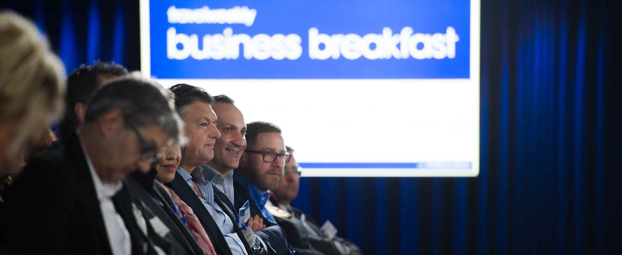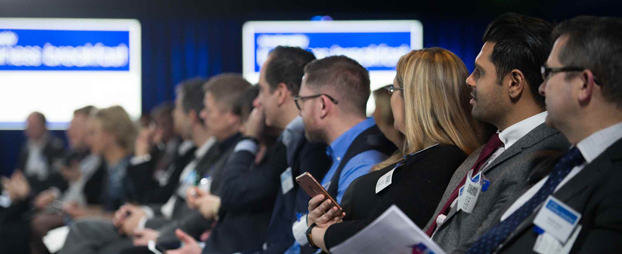Gallery: John Bevan Business Breakfast
Dnata B2B chief executive for Europe John Bevan tells a Travel Weekly Business Breakfast ‘agents are phenomenal’. Ian Taylor reports
John Bevan cut his teeth in online travel. Now at dnata, running the Dubai-based group’s trade operation in Europe, Bevan says he tells people, ‘Go to a travel agent’.
He joined dnata at the end of last year, so the January peaks period was his first taste of trading in the B2B sector. He describes it as “fantastic”, saying the company “traded positively into February and March”. Bevan explains: “We’re big into the US and Asia, but the standout was the Indian Ocean – we were 20% up year on year and 30% into March. The Caribbean was up 17% and the Middle East about 11% up.”
Bevan adds: “We’ve not seen the US struggle. We have a big programme to Orlando and a partnership with Virgin Atlantic and we have a high level of bookings into next year. The only destination we see down is Australia, which had all sorts of sporting events last year which are not there this year, and a little to South Africa linked to the water issue [in Cape Town]. Touring and tailor-made are also doing well.”
He dismisses the idea that bad weather in February and early March – the ‘beast from the East’ – had an impact on bookings, saying: “I’ve used the weather as an excuse a lot in the past, but I’m not an advocate of weather as an excuse [for poor bookings]. We did have to close the Glasgow office for two days because of snow, but it seemed to bounce back.”
However, he notes: “We are all long-haul, with a tiny bit into Europe. Overcapacity has affected the short-haul market. In long‑haul, there is some capacity coming in, [but] there is nothing in the data telling us there will be a slowdown. Our forward sales are strong. We are already 50% up year on year for 2019. We’re in a solid situation.”
He argues: “You have to think about departures rather than bookings. On long-haul, you need to get business in early. The way airlines price, they penalise you if you book late. I don’t think we have ever been able to do that in short‑haul. You get a glut of capacity released late that trashes prices. In long-haul it is not an issue.”
Bevan insists: “Short-haul is going to remain important. Europe will always be the UK’s number-one destination and Turkey is coming back. But it’s a volume game and it is increasingly automated, with machine learning following what customers are doing and where they might go next. It will be dominated by guys who have the money and technology, who can automate as much as possible.”
‘It was everything lastminute’
Bevan first entered the travel sector in France where he set up villa provider Bookthat.com and got to know lastminute.com.
“By age of the 30, I’d spent half my life in France,” he says. “We were driving enquiries to agencies and paid commission. This was the year 2000. We had a meeting with an investor lined up, then the [internet] bubble burst and the investor said, ‘Don’t bother’. We tried to sell the business to [publisher] Emap. Instead, I started work with Emap, they shut down the travel business and said, ‘Sell it’.
“The Online Travel Company ended up buying it and bought more brands to feed supply. I did that for four years and thought it was going well. Then it was acquired by lastminute.”
It was 2004 and Bevan initially thought “no way” would he work for lastminute. But Richard Bowden-Doyle, who was then running lastminute and is now chairman of Neilson Active Holidays, called and persuaded Bevan to stay on.
Bevan recalls a somewhat chaotic but exciting period: “At midday each day the site would fall over because there was so much traffic. [Founder] Brent Hoberman’s philosophy was if it is 80% ready, put it out.”
Texas-based Sabre Holdings purchased lastminute in 2005. Prior to that, Bevan says: “It was everything last-minute. Sex toys were quite a popular item until the Americans bought it and said, ‘You can’t have that’. [In the holidays division] it was a real trading environment – really last-minute. People were desperate [to get rid of stock] and we were screwing them down.
“The site was very slick at the front end. But behind the scenes we were sending faxes to operators with credit card details, everything. Anyone could walk past the fax and pick up the details.
“Really we should have invested in it. We had private equity investors breathing down our necks. The company grew too fast and the integration was poor. It was too much. Lastminute had 13 brands we were trying to integrate. If you acquire at that pace, you have to be careful. You have to keep investing and you have to keep the marketing teams separate. We had centralised services. As soon as you put them into one marketing team, you go down to one brand.”
After lastminute, Bevan ended up at members’ deals site Voyage Privé in 2010, where he stayed until 2013. He says: “In three years we were turning over £17 million, based on flash sales. We had an army of people in Romania doing all the benchmarking [of deals].
“We would send out an email with 40 offers twice a week, every week, with no change with the seasons.” The process became “boring”, says Bevan, although he enjoyed setting up the business.
He moved on to become managing director of Spafinder Wellness – a pay-to-list site and marketing and gift company for spas and wellness – when the owner decided to move the business to Miami and asked Bevan to set up in Florida. He oversaw the sale of that business when it was poised “to run out of cash”.
‘How can we deal with agents as clients?’
At that point in late 2017, Bevan says: “I applied to dnata and sent Andy Washington [chief executive for B2C in Europe] an email.” Bevan became dnata B2B chief executive for Europe.
He says: “It’s a change for me being in the B2B environment. Iain Andrew [dnata Travel divisional senior vice-president] didn’t want someone who has done B2B all their life. I hope I can bring my B2C experience. The way we communicate [with agents] has not evolved a lot. A lot of offers we put out are the same. We have to deliver better. How can we deal with agents as clients?
“We do everything we can to ensure a large sector are aware of what we’re selling. We’re not reliant on one destination [and] we sell throughout the country – regional departures are so popular now. We don’t suffer peaks and troughs. We have a lot of experienced people who are trusted by clients – our average call centre tenure is 7.8 years.
“We have two huge businesses [Gold Medal and Travel 2]. My key focus is on the websites, on e-tools and delivering to agents.
“We have B2C brands within the dnata portfolio, [but] we’re completely trade-facing.”
He adds: “We want to expand the B2B model into Europe. We’re looking at similar models, at tour operators focused on B2B, but it will be in a few months.”
Bevan insists he won’t be following the lastminute model at dnata. “Lastminute took as much cost as possible out of each acquisition and centralised,” he says. “We don’t have an overarching marketing strategy. We have our own product and planning teams. We have a centralised purchasing team at dnata. [But] we are a traditional tour operator. We haven’t got one product area. We have separate teams. We still produce brochures. It causes some interesting dynamics at times.”
He adds: “We sell more of other airlines than we do Emirates.” And that includes selling Qatar Airways, despite the boycott on Qatar by the UAE, including Dubai.
Bevan confirms: “We do sell Qatar Airways. We’re owned by Dubai, but we trade as an independent UK company. We’re free to put clients on whatever airlines are out there.”

‘Agents are phenomenal’
The dnata B2B chief sees the trade as vital, saying: “Agents are phenomenal at switch-selling, at pushing people into different destinations. There seems to be a return to going to someone who can advise, especially with long‑haul. Online is now so busy; people are flooded with information. I say, ‘Go to a travel agent – get someone to help you out’.
“So much is available online now. There is all this talk about reviews, which became really important. But they will become clouded because there is so much automation. Pretty much every hotel rating now is 8.5+. I don’t know if [review sites] filter reviews, but it has become more and more difficult to cut through [for consumers].”
He adds: “We ‘bucket’ consumers too much – we talkabout millennials as though they are different to the rest of us, and they are not. I prefer to talk about the Facebook or social media generation who research what they are going to post on holiday. It is about showing off.”
At the same time, he says: “Offline homeworkers are getting more and more respect. A busy person can do it themselves, but if you can phone someone and say, ‘You know me, you know what I want’, it’s easier. A lot of people are growing homeworking divisions.” Bevan recalls a friend who went to a tour operator, “then tried to book themselves and spent a day doing it”.
“In the US, people talk about ‘my travel agent’ like they do ‘my physician’,” he says. “In America, people book their own stuff nationally, but to travel internationally they use an agent.”
Gallery: John Bevan Business Breakfast
